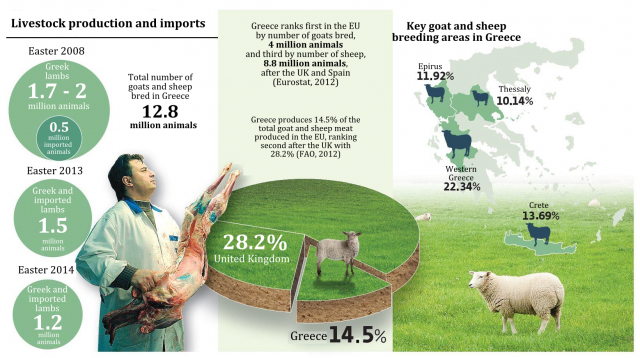Photo: tovima.gr
This year Easter lamb in Greece will be dear. It is not excluded that prices will significantly increase as a serious shortage of Greek and imported lamb is expected.
The economic problems of farmers, last summer’s drought that burnt the pastures and the diseases that "attacked" the animals have led to the reduction in domestic production this year in comparison with previous years. At the same time, imports from the Balkans which each year reinforce the Easter market will be limited. The reason is the limited production of Bulgarian and Romanian farmers due to the fact that they would prefer to sell to other more expensive European markets, as this year the Orthodox Easter coincides with the Catholic one. It is believed that many Greek farmers will do the same, if producer prices in Italy and Germany reach higher levels than in Greece.
This will become clear in the coming days as it is expected that traders and Greek producers will agree on the price. The bargaining has already begun and is likely to reach its peak at the end of the week. Currently producer prices are higher in comparison with the low levels of previous months. According to head of the Agriculture and Veterinary Medicine Directorate in Evia and Vice-President of the Greek Union of Veterinarians Antonis Panousis, producer prices have increased to 4.00 euro-4.50 euro per kilogram over the past few days whereas recently they had been in the range of 3.50 euro to 3.70 euro per kilogram.
This year's domestic production along with imports may increase to 1.2 million animals for Easter, as indicated by Vice-President of the Greek Association of Livestock Farming Eleftherios Gitsas for To Vima newspaper, who adds that there were 1.5 million lambs in the market last Easter. Nevertheless, these figures cannot be compared with the consumption of lamb at Easter before the crisis. "In 2008 there were 1.7-2 million animals in the market for Easter, about half a million of which being imported from competitive countries," says Gitsas.

This year, not only the limited production but also the fact that Catholics and Orthodox Christians will celebrate Easter at the same time changes the situation. "If prices in Italy and Germany are good, many Greek producers will prefer to export their production. Bulgarian or Romanian producers will do the same although the competitive countries in the Balkans have remained almost without livestock", explains Vice-President of the Greek Association of Livestock Farming.
In every case, farmers expect increased demand and higher prices. "Last year, the average producer price reached 5.5 euro-6 euro. This year we hope to obtain more," says President of the Greek Association of Livestock Farming Dimitris Kambouris.
The question now is whether farmers, the majority of whom are on the verge of survival, will decide to keep their animals until the Holy Week in order to obtain higher prices. It also remains questionable whether they will eventually give in to the pressure from supermarkets that use lamb as bait, selling it below its cost price, in order to attract more customers. As stated by Eleftherios Gitsas, "Supermarket promotions are disastrous for our sector. We are the only country in the European Union, which permits the sale of goods below their cost price."
Why is Greek stockbreeding ailing?
Higher production costs
The lack of fresh money and high production costs are the major problem and the reason for the limited production of lamb in Greece. This year, domestic production has declined by about 30%, according to Dimitris Kambouris, who argues that this is due to the fewer births as a result of poor nutrition during the mating and pregnancy of the animals.
"Farmers had no money for feed but the weather was not on their side either. The drought last summer contributed towards the shortage of animal feed and subsequently towards their reduced fertility", the specialist noted.
Indeed, as pointed out by Prof. Stamatis Angelopoulos from the Department of Agricultural Engineering at the Technical University of Thessaloniki, the sector is characterized by low competitiveness due to high production costs compared to other European countries. "The efforts to restructure and improve the competitiveness of the sector should focus primarily on reducing production costs, which are one of the biggest problems of the sector. It is necessary to increase the size of farms in order to achieve lower production costs and improve profitability", emphasizes Stamatis Angelopoulos.
It is estimated that nearly one third of the farms involved in sheep and goat breeding in Greece are viable. The pace of development in the sector is insufficient, as pointed out by Prof. Angelopoulos, who adds, "Very few farmers are included in producer unions oriented to standardization and trade."
Antonis Panousis agrees with him, believing that the problems faced today by farmers regarding the sale of their products, can be resolved if they are organized in producer unions and cooperatives.